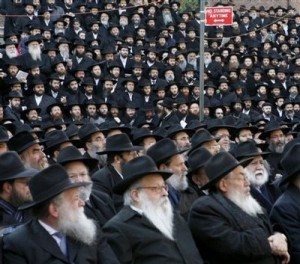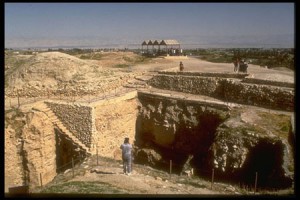Joshua 5-6 (Jericho)
Above: Family photo! Brooklyn, NY. 2007.
The version of the Hebrew Bible we will use today is once again brought to you by Chabad.org, the website of our favorite Hasids, the Chabadniks (pictured above). They should all live and be well.
Let's see what their ancestors are doing in the Book of Joshua, chapter 5.
5.13. And it was when Joshua was in Jericho, that he lifted up his eyes and saw, and, behold, a man was standing opposite him with his sword drawn in his hand; and Joshua went to him, and said to him, Are you for us, or for our adversaries?
5.14. And he said, No, but I am the the captain of the host of the Lord; I have now come. And Joshua fell on his face to the earth and prostrated himself, and said to him, What does my lord say to his servant?
5.15. And the captain of the Lord's host said to Joshua, Remove your shoe from your foot; for the place upon which you stand is holy. And Joshua did so.
When reading this passage, I always assumed "the Lord's host" is a reference to God's army of angels. Rashi, however, is convinced that "the Lord's host" is a reference to Israel, and on reflection he's more likely to be right. I think he and other religious Jews are almost certainly wrong, however, in identifying the captain as the archangel Michael; Michael's name doesn't pop up in the Tanakh until the Book of Daniel, which means he probably didn't have a place in Jewish mythology until the Exile.
This should go without saying, but the captain's not Jesus, either.
And naturally, that means the Mormon idea that the captain is both Jesus and Michael is right out.
No - the captain is God Himself. Notice that Joshua is told by the captain to remove his shoes, just as Moses was once told. Notice also that Joshua prostrates himself before the captain; the Jews who edited the Book of Joshua were fierce monotheists and never would have allowed this scene to remain if they thought Joshua was bowing to anyone but the LORD.
The Walls of Jericho
Above: The ruins of Jericho's walls. Cool, huh?
6.2. And the Lord said to Joshua, See, I have given into your hand Jericho and its king, the mighty warriors.
6.3. And you shall circle the city, all the men of war, go round about the city once. Thus shall you do six days.
6.4. And seven priests shall bear seven trumpets of rams' horns before the Ark; and on the seventh day you shall encircle the city seven times, and the priests shall blow with the trumpets.
6.5. And it shall be that when they make a long blast with the ram's horn, when you hear the sound of the trumpet, all the people shall shout a great shout; and the wall of the city shall fall down in its place and the people shall go up, every man opposite him.
Jericho's walls really did fall and the city was indeed destroyed, but not by Joshua; the city was burnt down roughly 150 years before the Bible's dating of the Israelite invasion. Joshua would have arrived to find the city abandoned. Jericho's sudden, violent ruin was more likely a famous story which the writers of the Book of Joshua attached to Joshua's conquest.
But wait! Don't get too depressed! There is indeed evidence of attacks from across the Jordan River in the fifteenth century by "shashu (Egyptian for wanderers) of YHW", whom the Egyptians list in their records as one of their many enemies. Anson Rainey of the Biblical Archaeology Review writes in an online article:
"A text in the hypostyle hall at Karnak that can be dated quite precisely to 1291 B.C.E. (to the reign of Seti I) tells of shasu pastoralists on the mountain ridges of Canaan. They have no regard for the laws of the Egyptian palace. A similar text locates a clash with shasu in northern Sinai or the western Negev."
"These shasu were the main source of early hill-country settlements in Canaan that represent the Israelites’ settling down."
These nomadic shashu attacked cities in Canaan during the Late Bronze Age and eventually settled in the highlands where the nation of Judah arose, all in the right time period. That's pretty exciting, isn't it? Even more exciting, writes Israel Finkelstein in The Bible Unearthed, is the fact that when archaeologists dig through these settlements, there's one usually common discovery which they just can't seem to find: pig bones.
OK, enough historical fact-checking. Back to the story.
6:17. And the city shall be devoted; it, and all that is in it, to the Lord; only Rahab the harlot shall live, she and all that is with her in the house, because she hid the messengers that we sent.
Notice the verb "devoted" basically means "kill/burn". We're talking about violent blood sacrifices here to the LORD, not only of animals and treasure but of people. The real difference between sacrifices to Yahweh and other gods isn't that Yahweh doesn't demand human flesh, but that the Israelites only have to kill enemies and not their own people. This is because of the Israelite system of redemption. Instead of having your firstborn son sacrificed on the altar of the Tabernacle, you're allowed by Yahweh to redeem (that is, buy back from Him) the child with a dove or bull. The Bible's first example of this substitution system is when Abraham receives a ram with which to replace Isaac.
Aaaaaand I think that'll do for today.
PREVIOUS ENTRIES IN THIS SERIES: Joshua 1, Joshua 2-4.
This entry was tagged. Bible Commentary Joshua

